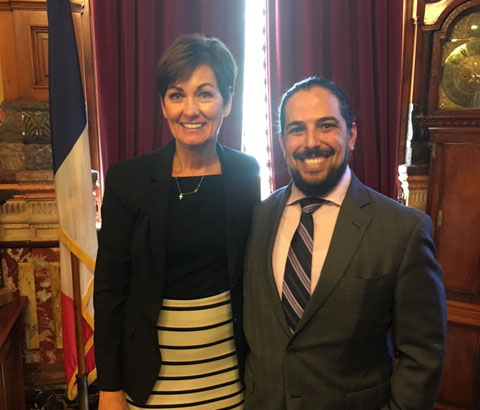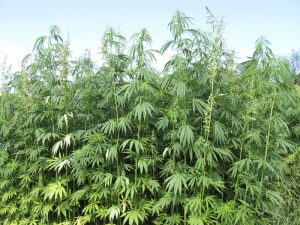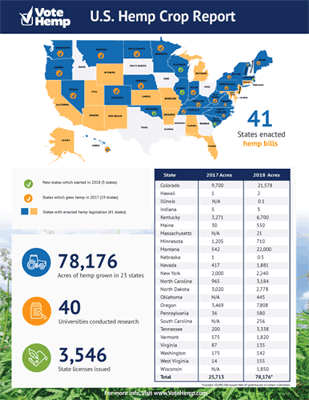DOVER — For the past few years, Sam Chick — owner of the smoke and vape shop “Puffster” in Dover — has been excited by the prospect of selling Delaware-grown hemp products in his store.
He’s been glued to the legislative developments, both nationally and in the state, that would make this possible.
Last year, the General Assembly green-lit SB 266 that cleared the way for commercial growing of the plant ahead of the federal farm bill — passed in December — that accomplished the same on the national level.
Hemp, not to be confused with marijuana, has a wide range of uses including as fibers, textiles, paper, construction and insulation materials, cosmetic products, a “natural remedy” for certain ailments, animal feed, food and beverages.
Although hemp and marijuana are both varieties of cannabis sativa — one of the three main subtypes of the cannabis plant — hemp has a much lower amount of tetrahydrocannabinol (THC), the compound in marijuana that causes the intoxication.
Puffster, just over a year old, mostly sells hemp-derived Cannabidiol (CBD) products, says Mr. Chick. Embraced by users for its alleged medicinal value, CBD is thought to be effective in treating anxiety, seizures related to epilepsy, chronic pain and several other maladies.
Though the way forward is now clear, Mr. Chick, a potential investor himself, and some farmers are disappointed with the new Delaware Department of Agriculture (DDA) regulatory structure announced last week.
The state’s new regulations bar commercial production of hemp for the 2019 growing season in favor of a limited “Hemp Research Pilot Program.” Interested growers must fill out an application, partner with Delaware State University (DSU) for research purposes and grow no more that 10 acres of hemp per approved organization. Though “general commercial activity” is still banned, the regulations will allow participating growers to sell their crop “if all research requirements are met.”
Calling the regulation “bureaucratic red tape,” Mr. Chick says they may limit investment and scuttle what could be the state’s first commercial growing season.
“The Ag Department should just get out of the way right now and let people do what they want,” he said.
A farmer west of Dover, John Foltz, agrees. While he’s pleased the state is setting guidelines, he wishes they were less restrictive.
“We’ve been working with DSU and the Department of Agriculture closely for awhile and we’re hoping that some of these shortcomings will get modified — but, I’m grateful that it’s finally getting done,” said Mr. Foltz. “Where I separate myself from the state’s mentality is: let the people do what they want to do as far as the size of their acreage. Farmers aren’t risky types of people, we do our due diligence and we don’t need a nanny government telling us how big or small we’re allowed to be.”
Converting a chicken house
Mr. Foltz said he’s in the process of submitting an application under the new program. He’s planning on converting one of his “chicken houses” to an hemp greenhouse. However, he also wants to explore the possibility of growing hemp outdoors on a larger portion of his farm. He hopes that restrictions don’t hamper his expansion plans once he decides to make them.
For it’s part, the DDA says the regulations were instituted this way because The United States Department of Agriculture (USDA) has yet to announce its own full set of regulations on commercially growing hemp.
“All the states are waiting for the USDA to promulgate regulations to go with their legislation,” said DDA deputy secretary Kenny Bounds. “The legislation passed by Delaware’s General Assembly last year enabled growers to raise hemp commercially when the Federal Government made it legal. They did do that, but we’re still waiting on those federal regulations now.”
Sympathetic to farmers and investors, Mr. Bounds says he understands their “frustration,” but the DDA doesn’t see it as prudent to leapfrog federal regulations.
“We’re anticipating that federal regulations will be put into place sometime this Fall — we’re hoping to be able to start growing the crop commercially in 2020,” he said.
For Sen. Anthony Delcollo, R-Marshallton, SB 266’s primary sponsor, the new regulations aren’t quite what he’d hoped for either.
“My intention was to authorize the growing of hemp like we grow any other grain, which is why we inserted the definition of what hemp was into that part of the statute,” he said. “This is much more constrained than what I had hoped would be implemented. Unfortunately, sometimes regulations get promulgated like this. It’s my goal still to have Delaware farmers grow hemp for general agricultural or whatever purposes they want and not have it limited to specific research purposes.”
Industry prospects
Regionally, Delaware appears to be somewhere in the middle of the herd when it comes to embracing commercial hemp production.
According to their respective Department of Agricultures, Maryland and Virgina both have research pilot programs worded similarly to Delaware’s. Both include the involvement of universities but are less restrictive with acreage.
New Jersey is still at the drawing board. A message on their Department of Agriculture’s website states that they’re “in the process of developing regulations for the Industrial Hemp Pilot Program.”
Pennsylvania, however, seems to be the most progressive with the newly legalized industry. Working with participants in a state-wide research pilot program for the last two years, the state recently announced that their past restriction have been eliminated. Acreage caps — previously set at 100 acres — have been lifted for 84 already approved applicants in the state, said the Pennsylvania Department of Agriculture. As for its approach to pending federal regulations, the agency simply says they will be “submitting a state plan to USDA.”
According to Mr. Chick, who was visiting a hemp seed supplier in Pennsylvania last week, the state’s more liberal approach will likely put it ahead of Delaware in developing its market.
“They’re way ahead of us already,” he said. “Their commercial program this year will allow growers to do mostly whatever they want which will encourage development and investment. A guy I know who grew an acre of hemp there last year, is moving up to about 20 acres cooperatively this year. Oil extraction facilities are popping up around the state to process the hemp too. Delaware could be taking a hands-off approach and let people do what they’re going to do, but because of these regulations, people who had bigger plans are going to be delayed and may consider setting up in another state. It’s frustrating as a businessperson to be told: ‘Sorry, we don’t have the right paperwork for you to grow something out of the ground.’ Hemp is a historically-grown crop all around the world — this really doesn’t have to be so complicated.”
Mr. Foltz is a little more optimistic about the state’s ability to get its industry off the ground, even with a delay.
“Delaware is a small state, I think we can advance an industry like this pretty quickly,” he said. “I’m not too worried about what they do in Pennsylvania. Once growing hemp gets big enough, no one area will have a lock on it anyway.”
Mr. Bounds feels the year under the research pilot program will be instructive to farmers and the university staff. A year’s worth of growing hemp in the state will help stakeholders make certain economic and agronomic decisions for the future, he claims.
“We think this will still be a good opportunity for farmers to evaluate the crop for things like yields and appropriate varieties suitable for Delaware soils,” he said. “We also have a lot to learn about the marketability of the crop and how that compares to other agricultural products.”
For more information on the state’s 2019 Hemp Research Pilot Program, visit agriculture.delaware.gov/plant-industries/hemp-program/.
Content from: https://delawarestatenews.net/news/hemp-investors-bemoan-bureaucratic-red-tape/.

 The state Plant Board on Thursday approved rules that will allow Arkansas farmers to grow hemp as part of a program to assess the marketability of the crop.
The state Plant Board on Thursday approved rules that will allow Arkansas farmers to grow hemp as part of a program to assess the marketability of the crop. Since the passage of Section 7606 of the 2014 Farm Bill, “Legitimacy of Industrial Hemp Research,” hemp cultivation in the U.S. has grown rapidly. The number of acres of hemp grown across 23 states totaled 78,176 in 2018—more than triple the number of acres from the previous year. State licenses to cultivate hemp were issued to 3,544 farmers and researchers; and 40 universities conducted research on the crop, more than double the number of licenses issued in 2017. The new 2018 Farm Bill, signed into law by the President on December 20, 2018, includes Section 10113 titled “Hemp Production,” which removes hemp from the Controlled Substances Act, places full federal regulatory authority of hemp with USDA, and allows State departments of agriculture to submit hemp program plans for approval and regulate hemp cultivation per their State specific programs.
Since the passage of Section 7606 of the 2014 Farm Bill, “Legitimacy of Industrial Hemp Research,” hemp cultivation in the U.S. has grown rapidly. The number of acres of hemp grown across 23 states totaled 78,176 in 2018—more than triple the number of acres from the previous year. State licenses to cultivate hemp were issued to 3,544 farmers and researchers; and 40 universities conducted research on the crop, more than double the number of licenses issued in 2017. The new 2018 Farm Bill, signed into law by the President on December 20, 2018, includes Section 10113 titled “Hemp Production,” which removes hemp from the Controlled Substances Act, places full federal regulatory authority of hemp with USDA, and allows State departments of agriculture to submit hemp program plans for approval and regulate hemp cultivation per their State specific programs.